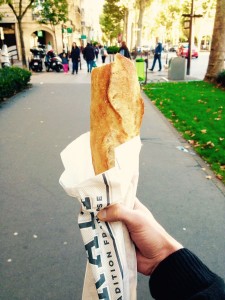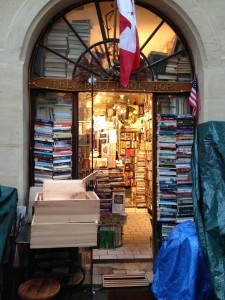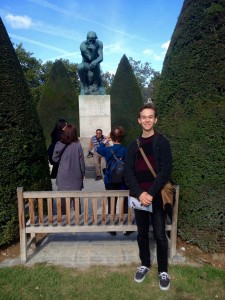Hi, everyone! Today, I’m writing from a cozy coffee shop in the 10th arrondissement. Yes, Paris is slowly coming around to the idea of coffee shops, though café terraces are still, and will always be, the norm. I’ve been thinking a lot lately about money’s role in study abroad, especially as I stare at the €5 drinks being offered at this particular coffee shop. As a complement to the talks on campus about finances and study abroad, I would love to share my own methods for saving money here in Paris. I hope these ideas will help those of you studying abroad next semester (or in the future), and they may even prove useful back in Claremont. Here it goes!
Saving Money Method 1: Locals
The number of times Parisians have helped me save money is a testament to how welcoming the people have been here in Paris. In my first week, after attempting to grocery shop “like a local” at the Sunday market, an elderly woman told me that most markets are not budget-friendly. My host family confirmed this, and for the rest of the semester, I decided to stick to the local supermarkets. A few days later, my French speaking partner mentioned that most brasseries and cafés offer “counter” prices for food and drinks. At many Paris restaurants, you rent the space for your meal, which, of course, comes at a price. Eating take-away or at the counter means big discounts!
Seeking out the knowledge of locals can be very helpful, but if you’re feeling less social, an equally valuable method is just watching. Why do the French always have a baguette or three in hand? They’re not only delicious, they’re cheap! Why does the local butcher always run out of rotisserie chicken? The price is unbeatable.

Saving Money Method 2: Better Locals
But rather than focus on locals in general, it might be best to focus on a specific type of local. Read: locals also on a budget. Read: local students. In my first few weeks, I was fortunate enough to meet up with Clémence, Oldenborg’s previous French language resident. To save money on food, she recommended doing what many French university students do daily: eat at a Resto U (a student cafeteria). Not only are the cafeterias an incredible deal, but also you get a great sense of life as a full-time student in Paris. For any study abroad program, I would recommend seeking out universities, student cafés, and libraries as much as possible. Book sales, cheap drinks, you name it. You might even see students raising money by selling inexpensive, fresh crepes (okay, that might just be Paris).

Saving Money Method 3: Student Discounts
ALWAYS ASK! And always carry the identification necessary to prove to any unconvinced ticket desk that you are, in fact, a student. Even if certain museums and attractions don’t advertise a student discount, they often exist (or can be bargained for). A few days ago, I climbed the towers of Notre Dame Cathedral. No student discount was advertised outside, but nevertheless, my visit was free. The Palais de Tau in Reims, France: Free. Musée d’Orsay: Free (with priority entrance no less!). The Louvre: Free.
In general, discounts can be found with a bit of research. One example here in Paris is La Forchette, a reservation website for restaurants that offers great deals. Student prices for travel are usually convenient, and citywide celebrations or events can mean unexpected free treats!

Saving Money Method 4: Travel Together
Study abroad is about exploration and discovery; don’t let a tight budget prevent you from day trips and independent travel. I recently discovered that the medieval town of Provins, France falls within the bounds of my metro/bus card, meaning a day trip is essentially paid for. Visiting friends in other cities and countries is the perfect way to save money on rooms. Airbnb with friends, youth hostels, shared transportation (like France’s blablacar) are all incredible ways to see the world. And last but not least…
Saving Money Method 5: Know Yourself
I saved the hardest for last. Study abroad means examining the values you hold back home and how they can translate to life abroad. This means a lot of different things. If you know creating an Excel spreadsheet to keep track of spending works for you, make it happen. If you worked a tough job the summer before study abroad and want to use that money for travel, book those train tickets. If eating healthy and staying active are priorities, buy a gym membership (don’t forget to ask for a discount), fresh produce, or just some new running shoes. Study abroad can be stressful, but I hope this post helps make finances a bit less so.
À la prochaine,
Anthony
